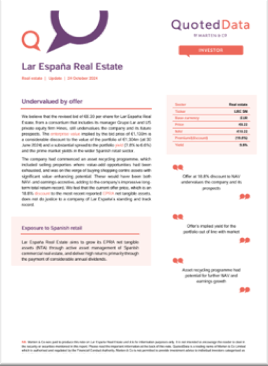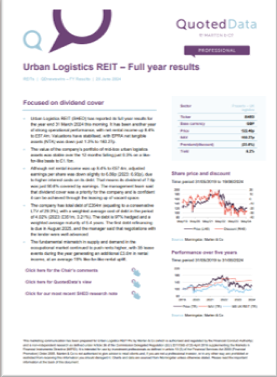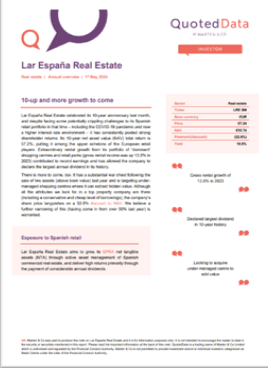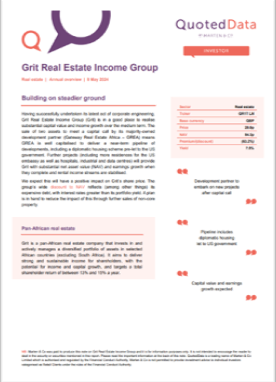November 2024
Winners and losers in October 2024
| Best performing funds in price terms | (%) |
|---|---|
| Life Science REIT | 7.2 |
| Residential Secure Income | 4.0 |
| PRS REIT | 3.1 |
| Phoenix Spree Deutschland | 2.6 |
| Globalworth Real Estate | 2.1 |
| Henry Boot | 0.9 |
| Target Healthcare REIT | 0.8 |
| Balanced Commercial Property Trust | 0.3 |
| Schroder European REIT | 0.1 |
| Triple Point Social Housing REIT | 0.0 |
| Worst performing funds in price terms | (%) |
|---|---|
| Workspace Group | (14.9) |
| Great Portland Estates | (11.9) |
| Tritax Big Box REIT | (11.3) |
| Helical | (11.3) |
| IWG | (10.2) |
| SEGRO | (10.2) |
| Safestore | (9.8) |
| Hammerson | (9.6) |
| Derwent London | (8.8) |
| Sirius Real Estate | (8.5) |
Best performing funds

Speculation and apprehension over the contents of the budget dominated October and was reflected in the share price moves among real estate companies with a median decline of 4.8%. There were a handful of positive movers, however, with Life Science REIT leading the way. This follows an uplift in its share price last month after its chair commented that the board was willing to take any action necessary to address its steep discount to NAV, which still lingers at around 45%. Residential Secure Income decided to throw in the towel having battled a persistently wide discount for much of its life (see the corporate activity section for more detail). Meanwhile, PRS REIT hoisted a ‘for sale’ flag over the company following shareholder pressure to act on its wide discount. Investors seem to be appreciating the solid progress Phoenix Spree Deutschland is making in delivering on its strategy to sell condominiums at large premiums to book value, with the Berlin residential landlord’s share price up almost 14% over the past three months. Target Healthcare REIT’s share price move was in step with its NAV performance over the quarter to the end of September (see below for more detail), while Balanced Commercial Property Trust was up slightly following last month’s take-private offer.
Worst performing funds

Budget nerves saw some of the largest listed real estate companies suffer the most as concerns move from inflation and interest rates to economic growth. It was no surprise, then, to see some of the largest office investors and developers in the bottom 10. Flexible workplace providers Workspace and IWG both succumbed to double-digit falls in their value over the month while, similarly, London office developers Great Portland Estates, Helical and Derwent London also experienced sharp share price falls. There is an integral link between GDP growth and demand for office space and worries that growth will be anaemic under Labour have surfaced. It was not just office players that got hammered, all of the property big guns were on the wrong end of investor caution, with logistics heavyweights SEGRO (which now has a market cap of £10.6bn) and Tritax Big Box REIT (£3.4bn market cap) also losing just over 10% in value during October. Retail behemoth Hammerson’s recent positive share price momentum was stopped in its tracks despite continued operational and balance sheet strengthening, including the launch of a £140m share buyback programme. It was a torrid month all round, with property bellwethers British Land (down 8.5%) and Land Securities (down 7.6%) also suffering.

Valuation moves
| Company | Sector | NAV move (%) | Period | Comments |
|---|---|---|---|---|
| AEW UK REIT | Diversified | 3.0 | Quarter to 30 Sept 24 | 2.9% like-for-like valuation increase for the quarter to £215.6m |
| Target Healthcare REIT | Healthcare | 0.9 | Quarter to 30 Sept 24 | Like-for-like valuation increased by 0.6% to £916.4m |
| Alternative Income REIT | Diversified | 0.5 | Quarter to 30 Sept 24 | Value of portfolio up 0.4% to £103.1m |
| PRS REIT | Residential | 10.9 | Full year to 30 June 24 | Value of group’s portfolio was £1.1bn, up from £1.0bn in 2023 |
| Town Centre Securities | Diversified | (2.4) | Full year to 30 June 24 | Like for like portfolio valuation down 4.7% to £256.0m |
| Grit Real Estate Income Group | Rest of world | (20.5) | Full year to 30 June 24 | NAV impacted by high debt levels and debt costs |
Corporate activity in October

Tritax EuroBox’s board recommended a cash offer for the company from Canadian private equity giant Brookfield that usurps SEGRO’s bid for the company. Brookfield’s bid of 69.0p per share values Tritax EuroBox at around £557m. This represents a premium of 6% to the implied value of the SEGRO offer of 65.1p at 9 October 2024. The offer price also represents a premium of 28% to the closing price of 53.8p per Tritax EuroBox share on 31 May 2024 (the last business day prior to the commencement of the offer period), but a discount of 12% to its last reported NAV.
British Land raised £301m in a placing, retail offer and subscription and will use the proceeds to part fund the acquisition of a portfolio of retail parks for £441m (see below for details). In aggregate 71,227,309 new ordinary shares were placed at a price of 422p, which represents a discount of 3.6% to the closing price on 2 October 2024.
Empiric
Student Property raised £56.1m in a placing and retail offer. A total of
59,686,950 new ordinary shares representing 9.9% of the company’s existing share capital were placed at a price of 93p, raising proceeds of £55.5m, with an additional £0.6m raised via retail investors. The proceeds will be used to
acquire two operational assets in Manchester and Edinburgh for combined £30m, while
the company has a broader pipeline of a further eight assets under negotiation.

PRS REIT announced that it was undertaking a strategic review to consider the future of the company following shareholder pressure. The review will explore all the various strategic options available to the company, which may include a potential sale. This follows the requisition notice made by a number of shareholders to replace the chairman, Steve Smith, and another director with Robert Naylor and Christopher Mills. The shareholders were unhappy at the award of a multi-year investment management contract to current manager Sigma without proper shareholder consultation and the lack of action to narrow the company’s discount to NAV. In September, Smith announced he would step down at the next AGM, while both Naylor and Mills were appointed to the board.
The board of Residential Secure Income proposed a managed wind-down of the company following a review of options for maximising shareholder value. The company’s persistent and material share price discount to NAV and its small market cap of around £101m (which it said may be a deterrent to some potential investors due to lower share liquidity) led the board and manager (Gresham House) to conclude that executing a managed wind-down and portfolio realisation strategy is the best course of action for shareholders. To implement this proposal, the board said that it intends to propose resolutions to change the company’s investment policy.
Impact Healthcare REIT changed its name to Care REIT plc to align with the Financial Conduct Authority’s updated sustainability disclosure requirements. Its stock market ticker is now CRT.
Hammerson commenced a £140m share buyback programme, with the sole purpose of reducing the company’s share capital. Shares purchased will be cancelled.

October’s major news stories – from our website
- British Land shops for £441m of retail parks
British Land agreed a deal to acquire a portfolio of seven retail parks for £441m. The purchase will be financed using the proceeds of its equity raise (mentioned above) and from existing cash and in place facilities. The seven retail parks are being purchased from Brookfield at a net initial yield of 6.7% and topped up net initial yield of 7.2%.
- Assura kicks off £225m disposal programme
Assura Group sold 12 assets for £25m, in line with the current book value. The proceeds will be used to partially repay the group’s revolving credit facility (RCF). The company is in discussions on further asset sales worth £200m. With this, the company said that it remains on track to reduce LTV to below 45% in the next two years.
- Regional REIT to install solar panels on offices
Regional REIT entered into a joint venture with leading pan-European solar panel developer, Sunbird Solar International, to install solar panels on its properties. Phase one of the installation programme will encompass 19 properties with an aggregate portfolio generation capacity of 4,173 kW and is expected to be completed within a year.
- Home REIT to fully repay debt after most recent auction
Home REIT sold a further 152 properties at auction for a total of £26.8m. Following the completion of these sales, it has sufficient proceeds to fully repay the outstanding Scottish Widows loan, which amounted to £72.0m at 30 September 2024.
- Henry Boot secures Virgin Media pre-let in Manchester
Henry Boot pre-let 45,700 sq ft of office space to Virgin Media O2 at its ‘Island’ office scheme in Manchester. Virgin Media O2 has pre-let the top five floors of the development, which is owned in a JV with Greater Manchester Pension Fund (GMPF), on a 10-year lease.
- Harworth snaps up Rotherham logistics estate for £43.7m
Harworth Group acquired a 285,000 sq ft urban logistics estate in Rotherham for £43.7m, reflecting a net initial yield of 5.4%. The asset, completed in 2023, is located close to the group’s industrial development Advanced Manufacturing Park. Comprising five units, the scheme is 90% let and once the final unit is let, the park will generate around £2.5m of rent.
- Leasing activity adds £8.5m to LondonMetric’s rent roll
LondonMetric Property added £8.5m to its annual rent roll with the completion of 139 rent reviews (delivering £5.7m of additional rent representing a 17% uplift) and 27 lettings (adding £2.8m of additional rent).
- Great Portland Estates buy West End office
Great Portland Estates acquired 19/23 Wells Street, in London’s West End, for £19m from British Land and intends to convert the space to fully managed offices.
- Life Science REIT achieves record rent at Oxford Technology Park
Life Science REIT completed a new lease with quantum technology business Infleqtion for 7,500 sq ft of fully fitted space at the Innovation Quarter (IQ) at Oxford Technology Park (OTP). It was achieved at a record rent for the park.
- Custodian Property Income REIT sells office at large premium
Custodian Property Income REIT sold a vacant office unit in Solihull for £1.4m, representing a 33% premium to the 30 June 2024 valuation. The office was acquired in early 2015
Visit https://www.QuotedData.com for more on these and other stories plus analysis, comparison tools and basic information, key documents and regulatory announcements on every real estate company quoted in London
Managers views
A collation of recent insights on real estate sectors taken from the comments made by chairmen and investment managers of real estate companies – have a read and make your own minds up. Please remember that nothing in this note is designed to encourage you to buy or sell any of the companies mentioned.

Diversified
Town Centre Securities – Edward Ziff, chairman and chief executive:
We have not seen meaningful rental growth in the commercial sectors in which we operate for a number of years, and don’t anticipate this to change for the foreseeable future. In the office sector, the work from home trend in the wake of the COVID pandemic seems to have stabilised with workers gravitating back to the office, which although slow is to be encouraged.
Across the country, prime space for retail and leisure is generally well occupied, although non-prime sites continue to struggle. Despite cost-of-living pressures, consumer demand in the food and beverage sector has remained buoyant. The retail sector has bottomed out and is where we see the opportunity for value to be found.
Alternative Income REIT – Martley Capital, investment adviser:
The UK economy is finding its footing in 2024 after a robust post-pandemic recovery. Though the initial surge has subsided, the short recession of late 2023 seems to be over and a more stable period is taking hold. The slowdown in GDP growth is expected to level off, with gradual improvement expected throughout the remainder of the year. Political stability in the UK could further bolster economic growth following the Labour Party’s win of the General Election with a sizeable majority. Consequential changes to the Government’s policies will likely have implications for the UK economy, and thus real estate. Additionally, inflation, while still relatively high, is projected to continue its decline and it is expected to settle at more manageable levels.
The cost-of-living crisis continues to cast a shadow, with consumers remaining cautious about spending despite some recent signs of improvement. This could lead to stagnant, or even slightly declining, retail sales in the coming months. To maintain profitability, businesses may still consider cost-cutting measures, potentially impacting employment levels and making unemployment a bigger concern in the latter half of 2024.
Curbing inflation remains a key priority, but there are positive developments in this regard. High inflation rates have subsided over the past year, falling to 2.0% (CPI, June 2024), bringing inflation in line with the Bank of England’s long-term target. The Bank’s aggressive interest rate hikes in 2023, culminating in the 14th consecutive increase to 5.25% in August 2023, are credited with helping to cool domestic demand and influence import prices, ultimately bringing inflation under control.
Financial markets were betting on a rate cut by the Bank of England, which materialised in August 2024 when rates were cut by 0.25% to 5%, with Capital Economics predicting a further drop to 3% by the end of 2025. However, the Bank faces a balancing act: to curb inflation without restraining economic growth. The modest 0.7% growth in the first four months of 2024 underscores the importance of finding the right balance. Stalling economic activity could lead to adverse long-term consequences, including a reduction in business investment, higher long-term unemployment and a decline in key sectors.
Despite a difficult global real estate market, with declining values for the past two years, prime yields have remained steady in the first half of 2024. This suggests most markets may be nearing the bottom of the cycle, prompting cautious investor re-entry.
Previous forecasts for steeper interest rate hikes (up to 5.75%) have been overshadowed by strong expectations for further rate cuts in 2024 and 2025. This shift in sentiment, along with a more optimistic outlook, could make real estate a highly attractive investment proposition. However, several risks remain unaddressed, including borrowers facing stricter lending conditions, and structural challenges persisting. An additional factor to consider is the growing availability of distressed assets. Banks are increasingly taking ownership of properties where long-term borrowers have defaulted. This presents a significant opportunity for global capital seeking to diversify through UK real estate.
Investors are seizing the moment to reposition assets to align with changing occupier demand. This comes as the gap between asking prices and offers narrows. UK Investment volume in Q2 2024 surged 11% compared to an already strong Q1, reaching £11.1bn. As market conditions strengthen, we can expect activity to pick up further. However, the focus for 2024 is likely to remain on generating and securing stable income, rather than chasing capital appreciation.
Tough economic conditions further emphasise the importance of sustainability, quality, location and flexibility for attracting tenants. These factors remain crucial for occupiers who are still focused on complying with regulations, retaining staff and minimising operational costs. This focus, coupled with limited supply due to rising construction and borrowing costs, is contributing to a rise in nominal rental prices across most sectors.
The MSCI UK Monthly Capital Value Index continued its downward trend in Q2 2024. While office values saw slight declines, retail and industrial sectors showed more resilience. As economic stability appears likely on the horizon, this decline could signal the beginning of a cyclical buying opportunity as new properties become available later this year.
Rising temperatures are driving renewed focus on physical climate risks from both investors and occupiers. This has led to a growing appreciation for the value of sustainable features in buildings. Investors and occupiers are increasingly interested in accurate measurement of these “green” features and how they translate to improved energy efficiency, ultimately impacting the corporate bottom line. As a result, we can expect stricter regulations, including mandatory disclosure of net zero transition plans.

Residential
PRS REIT – Stephen Smith, chairman:
The Build to Rent (BtR) sector in the UK is playing an increasingly important part in overall housing delivery. Its value as an accelerant in the delivery of mixed-development sites (those including private for sale, private rental and affordable homes) is well recognised and BtR is adding thousands of extra new homes to overall UK housing delivery. The UK BtR market still remains relatively undeveloped, especially when compared to more mature markets such as the USA and Germany.
The growth of UK BtR is being driven by the structural problems of the owner-occupied and rental markets, both of which are impacted by a severe shortage of properties, leading to strong rental growth. Over the last 20 years rental growth has averaged 3.2% compared to earnings growth that has averaged 3.1% over this period.
The new Labour Government is intending to reintroduce annual home delivery targets through the National Planning Policy Framework and has increased the previously discarded target of 300,000 new dwellings per annum to 370,000 new dwellings per annum. We believe that BtR has the potential to be an important contributor in the new drive for new homes.
The BtR sector has grown strongly over the last year. According to data compiled by Savills for the British Property Federation’s and published in July 2024, BtR completions in Q2 reached record levels, with the sector starting to make an appreciable difference to housing delivery across a growing number of locations within the UK. The total number of completed BtR units at the end of Q2 stood at 115,778 and the total number of BtR homes in planning was 57,000 homes, a near record level. However for the third quarter in a row the number of completions remained above the number of starts on sites. The continued slow-down in new starts is ascribed to ongoing sector challenges, including build cost inflation, cost of debt and the impact of economic and political uncertainty on investors. The British Property Federation called for more action to convert planning consents to starts on site and to bring forward new schemes through the planning proceed in order to service the huge rental demand.
There is a substantial shortage of properties in the UK for both the owner-occupied and rental sectors. CBRE, the global real estate adviser, reported that the UK’s private rented residential sector has lost about 400,000 rental homes since 2016 due to growing cost pressures and higher mortgage costs. Private landlords in the buy-to-let sector are still the largest provider of rental properties in the UK. They have been under pressure from an increasingly unfavourable tax regime, growing regulatory burden as well as base rate rises, and this pressure is set to continue. According to a report by UK Finance, the banking trade body, the value of lending into the buy to let sector fell by 52% over the course of 2023 equating to a reduction in loans from 25,280 in the last quarter of 2022 to just over 12,000 at the same point in 2023. Savills also reported in August 2024 that sales of second homes and buy-to-let properties had risen by 34% in the period 2021-2024 compared to the preceding three years, with these sales accounting for one-in-six of all property disposals, compared to one-in-fifteen in 2013-2014.
Challenges in the home ownership market have also continued to fuel demand in the rental sector. The median house price to income ratio at the end of 2023 was 8.1, according to the Office for National Statistics, which although lower than the preceding year (8.3), is still at historic highs while mortgage rates have also risen sharply over the previous two years. The deposits required for most mortgages still remain beyond the reach of many. By comparison, the PRS REIT’s homes remain very affordable. At 30 June 2024, the average household income of a PRS REIT tenant was £52,500 (30 September 2023: £51,000) and the average rent was £1,005 per calendar month (2023: £934), meaning that annual rent as a proportion of household income was 23% (2023: 22%). This reflects a combination of stronger wage inflation and the emergence of a wealthier cohort of potentially disenfranchised would-be home buyers who have entered the rental market.
The shortage of rental properties, with low stock levels and relatively low availability, remains evident. A report from TwentyCI and TwentyEA in early July 2024 stated that whilst some of the previous year’s pressure in the rental market was easing, availability remained at historic lows and that demand is still outstripping supply. CBRE’s Mid Year Market Outlook 2024 forecasts that stretched affordability will exert a downward pressure although this will take time to feed through, and as such forecasts strong rent growth of 6% in 2024 for the remainder of the year. A report from the Office for National Statistics, published in July 2024, noted that average UK private rents increased by 8.6% in the 12 months to June 2024.
In summary, it is clear that the market opportunity in BtR remains significant and that the sector remains an important means of fulfilling a social need and meeting demand for high-quality, well-managed rental housing in the UK.
Real estate research notes

An update note on Lar España Real Estate (LRE SM), which has been the subject of an offer for the company. We look at the merits of the bid given the performance and prospects of the company.

A result analysis note on Urban Logistics REIT (SHED). The company reported resilient performance in a rising interest rate environment, with its focus on growing earnings to provide dividend cover.

An annual overview note on Lar España Real Estate (LRE SM). Impressive rental growth allowed the company to declare the largest dividend in its 10-year history.

An annual overview note on Grit Real Estate Income Group (GR1T). Its latest act of corporate engineering has opened the door for new NAV and earnings accretive developments.
IMPORTANT INFORMATION
This note was prepared by Marten & Co (which is authorised and regulated by the Financial Conduct Authority).
This note is for information purposes only and is not intended to encourage the reader to deal in the security or securities mentioned within it. Marten & Co is not authorised to give advice to retail clients. The note does not have regard to the specific investment objectives, financial situation and needs of any specific person who may receive it.
Marten & Co may have or may be seeking a contractual relationship with any of the securities mentioned within the note for activities including the provision of sponsored research, investor access or fundraising services.
This note has been compiled from publicly available information. This note is not directed at any person in any jurisdiction where (by reason of that person’s nationality, residence or otherwise) the publication or availability of this note is prohibited.
Accuracy of Content: Whilst Marten & Co uses reasonable efforts to obtain information from sources which we believe to be reliable and to ensure that the information in this note is up to date and accurate, we make no representation or warranty that the information contained in this note is accurate, reliable or complete. The information contained in this note is provided by Marten & Co for personal use and information purposes generally. You are solely liable for any use you may make of this information. The information is inherently subject to change without notice and may become outdated. You, therefore, should verify any information obtained from this note before you use it.
No Advice: Nothing contained in this note constitutes or should be construed to constitute investment, legal, tax or other advice.
No Representation or Warranty: No representation, warranty or guarantee of any kind, express or implied is given by Marten & Co in respect of any information contained on this note.
Exclusion of Liability: To the fullest extent allowed by law, Marten & Co shall not be liable for any direct or indirect losses, damages, costs or expenses incurred or suffered by you arising out or in connection with the access to, use of or reliance on any information contained on this note. In no circumstance shall Marten & Co and its employees have any liability for consequential or special damages.
Governing Law and Jurisdiction: These terms and conditions and all matters connected with them, are governed by the laws of England and Wales and shall be subject to the exclusive jurisdiction of the English courts. If you access this note from outside the UK, you are responsible for ensuring compliance with any local laws relating to access.
No information contained in this note shall form the basis of, or be relied upon in connection with, any offer or commitment whatsoever in any jurisdiction.



